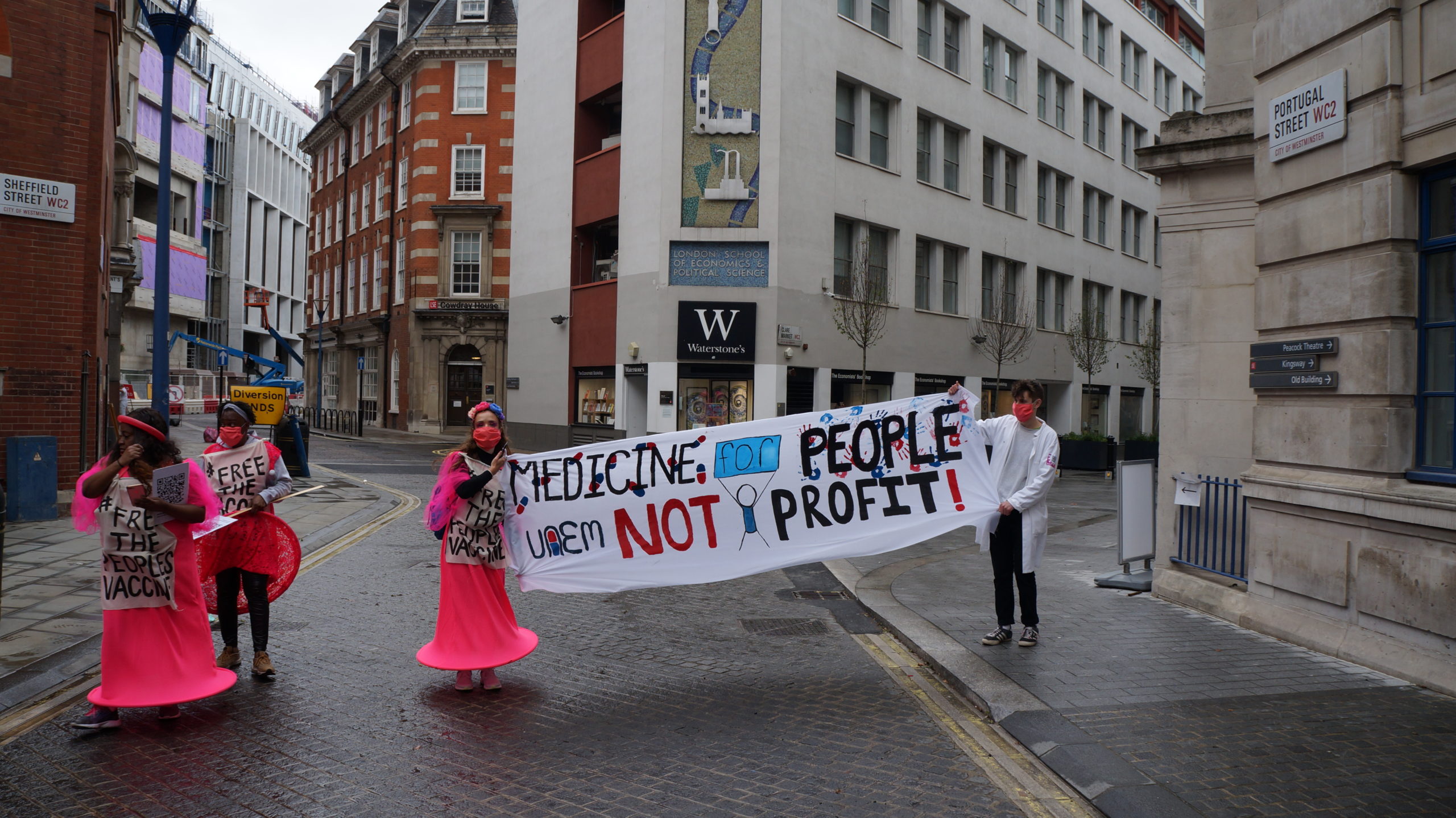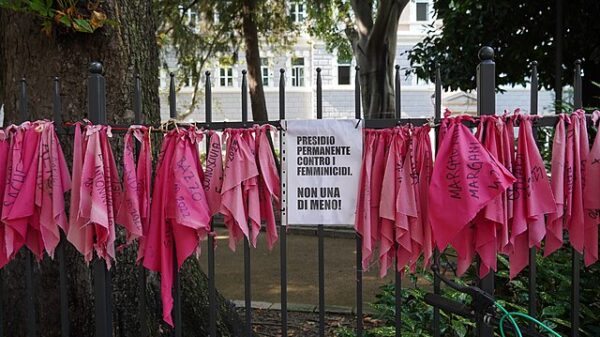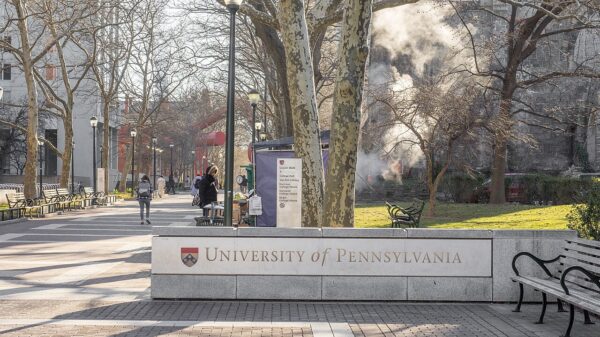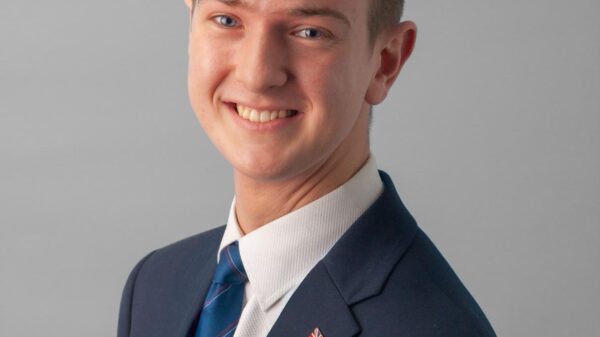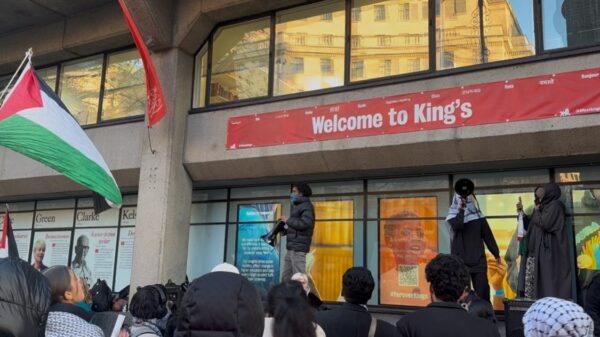A Carnival March was organised in London on July 27, by Universities Allied for Essential Medicines and Free the Vaccine for Covid-19, demanding that research institutions de-patent crucial research on Covid-19.
The campaigners’ key demand was that universities sign the Open Covid Pledge. Dressed in striking pink costumes and medical gowns, the group assembled at Guy’s campus to draw posters, some of which read “A vaccine cannot save the world unless it’s free” and “pandemics aren’t stopped by patents”. Singing a specially-written free the vaccine song, they raised smiles from passers-by on their route along the Thames, destination University College London (via the Strand and The London School of Economics).
Speaking outside Guy’s campus, third year medicine student Ayesha Khan said: “We want King’s to be fully transparent in regards to funding for all Covid-19 research, and promote open access Covid research using fair patenting. We want you to uphold socially responsible licensing for all Covid-19 intellectual property.
“King’s, you claim to have a global problem-solving mindset. We are an international community that serves the world. So what better way to uphold these values than to sign the open Covid pledge?”

National efforts will be negated if we fail to enact a truly global response” said a campaign spokesperson
On behalf of Universities Allied for Essential Medicines (UAEM) campaign, Ayda Haile-Redai, a third-year medicine student at KCL, told Roar News their major concern was that “exclusive licensing could result in a vaccine and other health technology that is not financially accessible to low and middle-income countries, as well as communities and individuals of lower socioeconomic status in more economically developed countries without a public healthcare system.”
“We don’t want profits being made from this pandemic, we want a People’s Vaccine, available to the world” said medical student Rebecca Hotchkin, in a campaign press release.
They pointed out the emergence of ‘vaccine sovereignty’, whereby “countries in Europe and North America negotiate with pharmaceutical companies for priority access to the vaccine. And as for the billions of people who reside in countries who cannot outbid the West?” said Ayda, “They will quite literally not get a shot at life until the richer countries say so.”
Ayda emphasised, “Life-saving healthcare technology developed on our campuses using public funds should be made available for global production without the impediment caused when universities grant exclusive licences to big pharma companies.”
“This isn’t a hypothetical scenario either”, and offered the example of tuberculosis (TB). “Whilst BCG immunisations were made available in Europe during the 1920s, it took another 50 years before it was available in South Africa due to the insurmountable cost. Perhaps in some part due to this, today TB is a leading cause of death in Africa whilst Europe’s TB burden is among the lowest in the world. With the Open Covid Pledge, however, multiple entities will be able to manufacture allowing for a sufficient global supply of an affordable vaccine.”
Launched in April this year, the Open Covid Pledge is a framework for research organisations to “make their patents and copyrights freely available” to combat the pandemic. “Let’s share intellectual property to fight COVID-19”, their website declares.

Gathering on an otherwise deserted Strand
When asked about positive examples from the 20th century, Rebecca remarked after the protest, “I think a really good example is the polio vaccine, developed by Jonas Salk. He famously had the quote ‘could you patent the sun?’ when asked about patents for this vaccine. That shows how key vaccines are for global health and the public good, and because of this vaccine not being patented governments around the world have been able to use it to basically eradicate polio in a number of countries, and hopefully soon around the world.”
Ayda also drew attention to KCL’s self-definition as a university, which prides itself on being “an international community that serves the world”.
“Data that could be of value to other universities engaged in vaccine development could be generated at KCL”, she remarked. Whilst vaccine development was described as a “focal point”, the Free the Vaccine movement and the Open Covid Pledge were said to “encompass health innovation for COVID-19 beyond vaccines, including tracking tools, diagnostics, treatments and data… so patents and copyrights pertaining to these should also be made freely available.”
Furthermore, “the more universities sign up to the Open Covid Pledge, the more other universities will feel compelled to do so. KCL could influence other universities which are directly involved in vaccine development to also make a pledge’, stated Ayda.
KCL-based research is helping to turn the tide against Covid. The campaign additionally states that, “Without the collaborative scientific environment that is engendered by the stipulations of the Open Covid Pledge, such data may never be shared between institutions, prolonging the time taken to develop the vaccine we so urgently need.”
Ayda said that collaboration was a “win for everyone” as well as being a “moral imperative”. She continued, “As students, we are deeply invested in ensuring our university steps up and does its part. Universities are uniquely positioned as holders of intellectual property rights, to put in measures to eliminate pharmaceutical monopolies and to ensure their innovations can be accessed equitably. The Open COVID Pledge facilitates exactly that.
“As recipients of public funding, universities also have a duty to ensure they are serving the best interests of the global community and not just the pharmaceutical industry. Experience tells us once the vaccine is discovered through publicly funded research, pharmaceutical corporations will want us to pay high prices to acquire it, both at the level of the health system in the UK and at the point-of-delivery in other countries. This means taxpayers pay twice, and not everyone in the world will be able to afford access.”
Calls for a ‘people’s vaccine‘ started in May, in advance of the annual World Health Organisation assembly. Patent pools were put forward but also criticised for being insufficient. As of 28 July 2020, there are 25 coronavirus vaccine candidates in clinical development.

